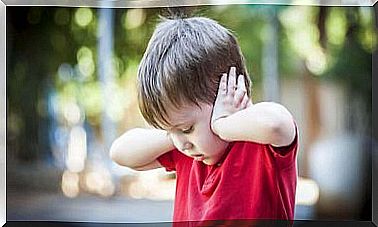Traits Suggestive Of Psychopathy In Children

In this article, we list the most common traits suggestive of child psychopathy. These include several different ways and behaviors.
Psychopathy is defined as abnormalities in a person’s patterns of behavior caused by personality disorders or psychological disorders.
This basically means that a person with psychopathy, who in this case is a child, has full mental and physical capacity, but has not adapted to his environment due to problems in his brain.
Although the word psychopath has a bad echo and is usually associated with adults, infants can also have psychopathic traits. In fact, the majority of adults with psychopathy have had symptoms since childhood.
It’s important to understand that a psychopath isn’t always the crazy, violent criminal we see in movies. He may simply be a person who lacks empathy or sensitivity, as we describe below.
The main consequences of possible psychopathy are manifested in the child’s way of relating to his or her environment. In addition to this, the child is also difficult to handle.
Traits suggestive of psychopathy in children
How do you identify a child with psychopathic traits? Children with some type of psychopathy usually have evidence of one or more of these behavioral problems:
- They are self-centered, unable to share their own, and very demanding and inflexible in relation to their parents.
- They are often disobedient. If they seem obedient, it usually happens under pressure, and they also try to get out of the situation without consequences.
- They hardly express their feelings. Emotions are usually well expressed in children. If a child almost never presents their external reactions to their environment, it may be a sign of psychopathy.
- They don’t experience much empathy. They have difficulty recognizing and interpreting the feelings of others. In addition, they also find it difficult to form emotional relationships with other people.
- They are cold-hearted. They feel no guilt or remorse, nor do they apologize for their bad behavior, which often allows them to communicate their own dominance in the form of either physical or verbal aggression.
In adolescence, psychopathy is usually indicated by a tendency to rebellion and breaking the rules.
Adolescents may also experience the use of harmful substances such as alcohol, tobacco or drugs.
Of course, such use can also occur without psychopathy.

Diagnosis of psychopathy in a child
As we mentioned earlier, some of these signs of possible psychopathy may only be part of a child’s character traits. But psychopathic properties are long-lasting and permanent.
They usually appear around the age of five, when the child begins to expand his or her social circles.
If the child is not psychopathic, such bad behaviors and attitudes will disappear as the child adopts the rules and values that guide social life.
In the case of psychopathic children, this does not happen because they do not feel guilty about the things they do.
Because of their inherent aggression, it is impossible for them to understand another person’s pain or experience compassion even for their closest friends or family members.
However, modern technology allows us to measure brain responses to specific stimuli, and thus we can potentially identify psychopathic traits using positron emission tomography.
What causes psychopathy in a child?
In psychopathy, as in other mental illnesses, there is no single specific or specific cause. Instead, we need to talk about combinations of different factors.
There are mainly three different types of causes of psychopathic traits:
- Genetic factors: Children whose parents, grandparents, or close relatives have experienced psychopathic traits are more likely to experience these same traits than other children. This also applies to twins.
- Biological factors: The development of psychopathy may be due to damage to the brain or brain dysfunction. Another cause of this disease can be found in the poor connection between the almond nucleus of the brain (which is responsible for regulating emotions) and the frontal lobe shell.
- Psychological factors: Psychological damage caused by certain types of negative circumstances, such as violence or abuse, can also contribute to psychopathic behavior.

Advice on treating possible psychopathy
Psychological therapy is one very complex treatment option for these symptoms, which, according to psychologists at University College London, manifests in one in a hundred children.
This is because patients themselves do not have the ability to communicate with others in good faith and openly, especially with people they do not know, such as therapists.
But an intensive and long-term psychological treatment plan in an institution with appropriate staff and multidisciplinary teams can work.
Staff and teams are important in this regard, as leaving an individual responsible for a psychopathic person can be very detrimental to the mental health of the caregiver.









